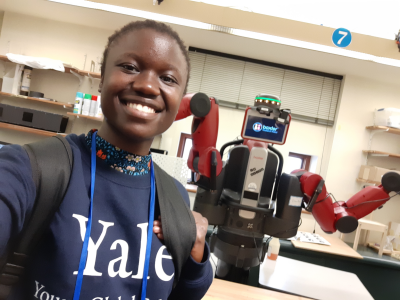Thembi Gausi '24 Attends Yale Model African Union Conference in Rwanda

Meeting with other delegates at the first Yale Model African Union (YMAU) conference, held recently in Rwanda, Thembi Gausi ’24 discussed a wide range of topics addressing the quality of life in various African countries.
 Gausi traveled to Rwanda with a grant from the department of Mechanical Engineering and Materials Science that paid for the expenses of participating in the conference. The three-day event drew students from around the globe to discuss some of the most pressing challenges affecting life in Africa. The organizers said that Rwanda was chosen as the site for the conference for the progress that the country has made since 2000 in conjunction with the government of Rwanda’s commitment to development and innovation.
Gausi traveled to Rwanda with a grant from the department of Mechanical Engineering and Materials Science that paid for the expenses of participating in the conference. The three-day event drew students from around the globe to discuss some of the most pressing challenges affecting life in Africa. The organizers said that Rwanda was chosen as the site for the conference for the progress that the country has made since 2000 in conjunction with the government of Rwanda’s commitment to development and innovation.
Gausi, who majors in Mechanical Engineering, served on the Committee of Heads of State as a representative of Mali, a role that gave her the opportunity to research and discuss a number of topics of particular interest to her.
“I’m really interested in sustainability and infrastructure, but also in seeing another perspective of engineering and how the engineering solutions are affected by those who actually make political decisions,” she said. “So being on the Committee of Heads of State, I was able to engage in crucial conversation with decision makers whilst still being able to participate in the speaker series for Sustainability and Infrastructure.”
One of the ideas that came out of the conference that particularly resonated with Gausi was the importance of tailoring solutions to the real-world conditions at the site of the problem.
“It really did open up my mind a lot more to looking at how something can be done, but it's very important to look at how that will be done in Zimbabwe, or Malawi, where I'm from, because it is true that there aren’t unlimited resources,” she said. “How can we be sustainable and how can we get the same job done in a different way?”
A genuinely useful solution, she said, is one that takes all the variables into account. For instance, the weather in Malawi doesn’t require the most powerful heating or cooling systems available.
“I think the biggest takeaway for me is that we need to think about what's actually needed, and not to produce something that's the most high-tech and the most fancy, but to produce something that actually addresses the issue in the most effective manner.”
“The Department of Mechanical Engineering & Materials Science was thrilled to offer this grant to Thembi because she represents the engineering leaders who will solve the most pressing problems in Africa and throughout the world,” said Corey O’Hern, professor of mechanical engineering & materials science.

